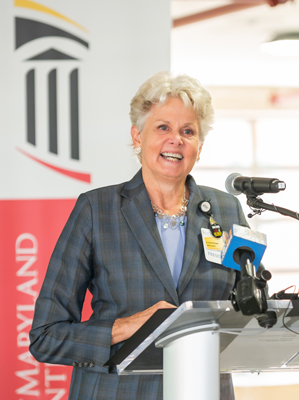 Alison Gates Brown, MPH, BSN, knew early on that she wanted to serve in healthcare. Alison began her career path nearly 45 years ago, caring for other people as a nurse, laying the foundation for her life’s work. If so inclined, she could recite a laundry list of reasons she’s proud of her accomplished career. However, she acknowledged she is most proud of partnering with the people—staff, physician colleagues, leaders, students, and philanthropists—who support the University of Maryland Medical System (UMMS) to make a difference in the lives of the people and communities they serve.
Alison Gates Brown, MPH, BSN, knew early on that she wanted to serve in healthcare. Alison began her career path nearly 45 years ago, caring for other people as a nurse, laying the foundation for her life’s work. If so inclined, she could recite a laundry list of reasons she’s proud of her accomplished career. However, she acknowledged she is most proud of partnering with the people—staff, physician colleagues, leaders, students, and philanthropists—who support the University of Maryland Medical System (UMMS) to make a difference in the lives of the people and communities they serve.
The former president of UMMC Midtown Campus, Alison, spent over 30 years of her life caring for others. She blended her clinical expertise, business acumen, and empathy to ensure equitable access to high-quality patient care. During her six-year tenure as president, she fostered an inclusive and diverse culture throughout the campus. Alison believed that community connection, through outreach, engagement, and workforce development, was essential to the success of UMMC Midtown Campus.
UMMC Midtown Campus provides specialty outpatient care for adults and children in West Baltimore and surrounding regions. It offers primary care, behavioral health, diabetes, and post-acute rehab services, while UMMC Downtown specializes in trauma, cancer care, and transplants.
“Midtown is also a safety net for people affected by longstanding health disparities,” she added. “At every juncture, the people who work at Midtown, from housekeeping and facilities to social work and nursing, collaborate to deliver safe, compassionate, and respectful care. These are dedicated people, supporting their neighbors and each other.”
Alison emphasized the need for partnerships between public and private organizations and philanthropists to address Baltimore’s issues. Philanthropy can help break down barriers and provide essential programs and services that treat the whole person. Donors’ gifts can address health inequities such as access to food, immunizations, safe housing, and transportation to medical appointments.
“Philanthropy fills gaps in meaningful ways and makes a measurable difference in how we partner with people to achieve their best health, physically and emotionally,” Alison continued. She added that something as simple as providing home blood pressure monitoring kits can make a big difference. These items significantly enhance the ability to support optimal health. “These are not nice things to have; they are essential. If you want to improve the health of individuals, a community, or an underserved neighborhood, you must have resources,” she emphasized.
Midtown’s Community Health Education Center (CHEC) recently opened a food pantry exclusively for pediatric patients and their families to address emergent food insecurity, one of the many social and economic realities impacting children’s health and well-being in West Baltimore. “Without healthy food, children are less likely to thrive physically, emotionally, and academically,” Alison explained. Mariellen Synan, manager for Community Health Improvement, credits Alison’s support for making it a reality and hopes to expand the pantry’s use through philanthropic investment.
“People must have basic needs met to achieve a healthy life, complemented by visits to a doctor, nurse practitioner, or, if necessary, the emergency room,” Alison said. “For some people, choosing between food on the table or filling prescription medications is a difficult and very real choice.”
During her remarkable career, Alison has seen firsthand, as a staff member and a donor, the difference philanthropic support makes in healthcare.
“It’s been a real privilege to connect patients to the care they need. What we’ve done and what we continue to do—it’s making a difference; it’s having an impact; it’s changing lives.”